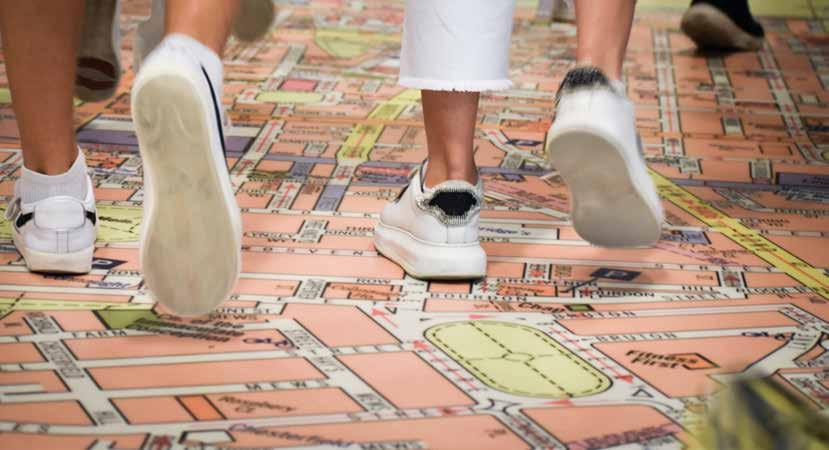
16 minute read
Productions and Performance
Care, guidance and support
BSB futures and the post-school journey
Advertisement
In Autumn 2021, BSB Futures found a home in the Pathfinder Hub, a newly created segment of the Care, Guidance and Support team aimed at helping Secondary students to explore their aspirations beyond BSB. This was not only a physical move as the BSB Futures office is now firmly embedded within the post-16 space in Mercator, but it was also an ideological move; under the Care, Guidance and Support umbrella, the programme focuses more than ever on raising the student aspirations and promoting self-reflection throughout the Secondary journey. The Futures programme helps students to make well-informed choices about future career opportunities based on real life examples and mentoring.
This shift is evident in a number of growing initiatives. In addition to its staple career and university talks, BSB Futures now offers students 1:1 meetings with mentors working or studying in their field of interest. All Secondary students have the opportunity to get specific about career concerns that they may not otherwise raise in a group setting and get an honest glimpse into what actually happens behind the scenes of their ‘dream job’. These sessions can be especially useful for older students as they move toward university applications or other post-BSB pathways. Kheya, a Year 12 student considering a career in Finance, was paired with professionals at Goodyear, Barclays and Alpha FMC: “Having these bespoke sessions is really enriching and stimulating to my learning,” she said. “I wanted to know more about what a career in Finance entailed. I was given lots of specific advice about how to excel in finance and how the university structure works. I’ve learnt that there are many things to do, however it is ok to make mistakes. I’ve also learnt how to make the most of my time here at BSB.”
Two of the professionals who helped Kheya were themselves former BSB students, a population that has become increasingly active across BSB Futures programming. Alumni of all ages and professional backgrounds have proven as enthusiastic about imparting their wisdom and experience as we have been to welcome them back; after all, who can offer a more relevant perspective than someone who may have literally sat in our students’ places only a few years ago?
After multiple meetings with a Year 10 student whose heart is set on working in railway transport, alum Dominic Mottram of Network Rail said, “Having the opportunity to give back to the community and the students that were me ten to fifteen years ago is brilliant to do. It’s really important to feel like we’re giving back, but also giving students the opportunity to have different perspectives and to see where learning and things at BSB can take you around the world.”
In addition to the more obvious benefits of alumni participation, it is our hope that current students will feel inspired to share their stories and understand that their voices are valued here long after they leave the school.
BSB Futures’ place in the Pathfinder Hub also marks a major step forward in embedding careers programming into the curriculum. Beginning in the 2021-2022 school year, we have teamed up with Hub colleagues in the Higher Education office to ensure that every Year 10 student knows how to use Unifrog, a fantastic online resource with in-depth information on universities, apprenticeships, programmes of study and career paths. Each Year 10 tutor group now receives three full lessons in how to navigate and make the most of the platform.
With this foundation, students can explore their personal strengths and interests independently or take time to discover new ones in a low-pressure environment. They will also feel more comfortable using it in Years 12 and 13, when most will need it to organise their university applications. Furthermore, staff are working closely with the Year 7-11 PSHE programme to embed careers within the course’s 2022 – 2023 curriculum. PSHE’s focus on social and emotional learning is very much reflected in our approach to careers. Instead of focusing on a particular job, students are invited to formulate a mission; a student who seems fixated on becoming a doctor, for example, might be encouraged to reframe their goal as one of improving global or local healthcare. Reflecting on what values lie at the heart of their interests can keep students open to more options for the future and adds a new layer of depth to their aspirations and identity.
It is our hope that this approach, combined with workshops such as how to formulate an elevator pitch, create your own business card, write a CV and interview for imaginary jobs, will alleviate some of the concerns surrounding the future, grounding them within their own skills and strengths.
Tom Vuerinckx, teacher and Coordinator of the Year 7-11 PSHE programme, looks forward to strengthening the connection between PSHE and BSB Futures.
“We strongly believe that it will help us to achieve our aim, and that is supporting our students in building a positive identity, nurturing healthy relationships and making responsible decisions,” Tom said. “These life skills will empower them to take a grip on the steering wheel of their lives and to plan out a route that will lead to their happiness and success.”
Productions and performance
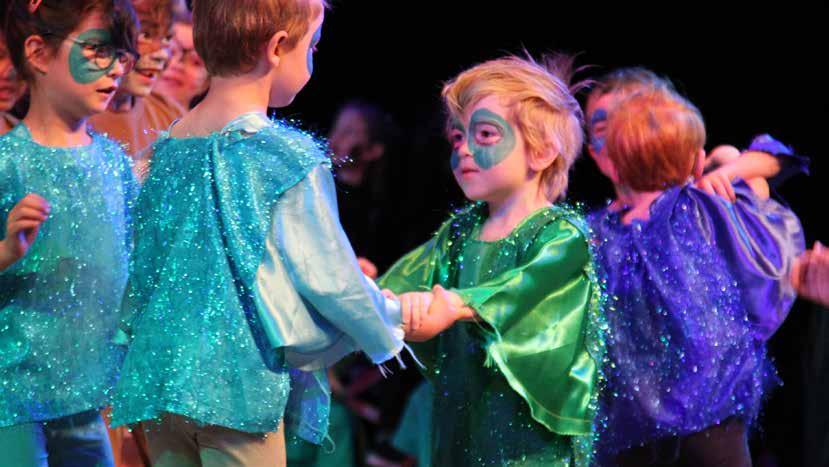
Filling the school with joy and happiness
No part of the school community remained unaffected by the onset of the coronavirus pandemic as it took hold in 2020. Despite the restrictions brought in to combat the spread of the virus, and the effects they had on activities where contact and proximity were an integral part of their essence, every department dug deep into their reserves to overcome the unprecedented obstacles put in their way.
This is the story of how the courage, conviction and persistence of students and staff alike kept the spirit of performance and presentation alive during a two-year period of trials and tribulations and how they continued to fill the halls and rooms of BSB with joy and happiness. Told by: Christi-Ann Nancarrow, Faculty Leader Performance & the Arts, Jane Whitehouse, Department Leader Drama, Neil Ringrose, Head of Primary and one of the Vice-Principals at BSB, and Esther O’Connor, Team Leader Early Years.
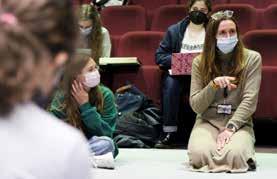
Everything seemed so normal in the Music Department at BSB at the start of 2020. The production of Hairspray: The Musical in December 2019 had been a remarkable success and with great optimism and enthusiasm, the staff began planning the school’s Music Festival, which was to take place in March 2020. Instrumental teachers were working hard to prepare their students to perform solos, duets, and trios in front of a visiting adjudicator from the UK, whilst choirs and other larger ensembles started working on their new programmes for the event.
By mid-March everything was organised and ready to go, with rehearsals reaching the final stages, when a period of confinement was called approximately one week before the festival was due to take place. The adjudicator had to cancel their travel arrangements at the last minute and the students were unable to perform, as everyone was stuck at home.
In the meantime, class music lessons had to change significantly to work online. Listening exercises took over from the usual performance and composition lessons for KS3, whilst at GCSE, IB and A level, some composition lessons also took place online, with student and teacher each sitting at a piano in their homes, exchanging musical ideas and possibilities for development. The course work pieces for IB were largely generated in this manner, and in true BSB spirit, the students overcame the difficulties to come through with some magnificent work. Thankfully, all performances for GCSE and A level had already been recorded before the lockdown, or this could have been really problematic in terms of results.
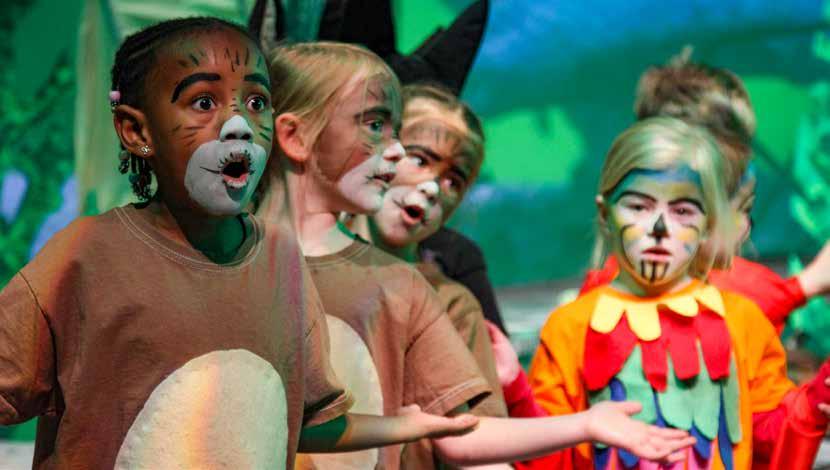
Over in the Early Learning and Primary departments, structures that had been put in place to improve and develop ideas of community and connection through presentations and productions were also disrupted when the school was forced to shut down and students were required to attend classes online from their own homes. The staff were faced with challenges around maintaining development and improvement, and the activities designed to help students build up their courage, resilience, and confidence – values we pride ourselves on at BSB, when the children were no longer on campus. The use of technology during that time to try and maintain community and connection was vital. One of the most heart-warming experiences of that whole time came when the singing assemblies adopted a similar approach. One class would be singing in the hall while being live streamed to other classrooms. The joyful sound of other classes singing along would fill the halls and it was moving to hear as the songs drifted through the school with everyone joining in.
The technology was also utilised to allow productions to tentatively be planned and organised again, with the events being filmed and presented as mini movies to families at home. In Primary, all students, if they were in school, were able to take part in productions which were adapted to the realities we faced, and the technology we had introduced allowed us keep going. The situation unfortunately did not allow parents to attend the productions on campus but by filming them and making them available online, staff managed to maintain that special connection.

Primary students were involved in filming productions in the school’s Brel theatre and in other locations around campus. Staff ensured that, despite the circumstances, continuity was maintained as much as possible with regular productions involving all Primary students taking place in Brel, just as they had been before the restrictions were brought in. It was important that every child in every year group – if they were on campus – was involved and took part. And the children, of course, rose to the challenge and participated with typical enthusiasm, whether it was for the camera or later, when we started to have parents back on campus for the shows.
Hope remained that the school (and the wider world) would return to some semblance of normality by the summer as another big and important event had been planned: the concert to celebrate the school’s 50th birthday. Music was selected for choirs, bands and orchestras and special guests were invited to come from a variety of countries for the occasion. The list was to include former principals of the school, board of governors, trustees and so on. Unfortunately, the concert in the summer term was postponed. By the end of the academic year, the Music Festival, Associated Board of the Royal Schools of Music (ABRSM) exams, and Summer Concert had all been cancelled. Meanwhile, in the Drama department, teaching in some classes had returned by the end of the Summer Term 20192020. Elsewhere, adaptation to teaching approaches was needed when a whole IB unit of work had to be cancelled. Thankfully, everything at A-Level continued. The staff did have to restructure a lot of the planning, though, as IB and A-Level were taught together.
Despite things looking bleak as the students and staff broke up for the summer holidays, the return for the new school year in September 2020 brought with it a sense of determination to adapt to the new realities and somehow make it work. Staff members started to consider alternative ways to manage some of the planned performances and events for the new academic year.
Cancellations were still a regular occurrence, unfortunately, and the school’s usual ‘instrument try out day’ in September was also cancelled. Instead, the instrumental teachers were asked to each prepare a video to demonstrate their instrument, instead of the usual live demonstrations, to show students and their parents what was on offer.
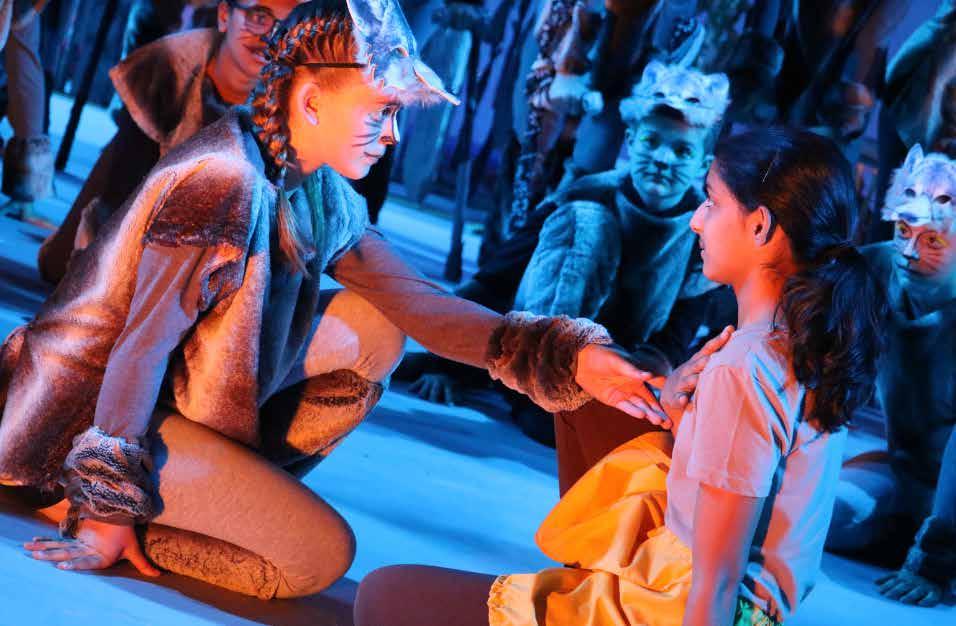
The year started with a mixture of online and in-school lessons across all departments, and in the school’s acting groups, musical bands and ensembles started rehearsing under the new rules, observing social distancing, and wearing masks. For the Drama students, many struggled with creating the relationships which are at the heart of acting, something the staff make a point of emphasising throughout their lessons. These important relationships were suddenly strained emotionally by apprehension and physically by masks and distancing. Emotions and actions felt like they were on shifting sands. Students and staff alike fluctuated between the creative drive to find innovative solutions and exhaustion at repetitious limitations. Meanwhile, in the Music department, there were other challenges. The instrumental teachers had to be very flexible, as students were sometimes in school and at other times at home, whilst visiting external teachers were not allowed into school. This was the most demanding situation for the teachers as they then had to use evenings and weekends to teach online when the students were at home and available.
Even though the situation provided both students and staff with problems and obstacles to overcome, there was a growing sense of optimism and excitement throughout the school as it became clear that everyone was finding a way to overcome the difficulties and rise above them.
The winter holidays came and went, and by the time school started again in the New Year, it became clear that – one way or another – there would be a Music Festival in 2021, even if there would be no live audience. Showing great resilience and determination, the music department started planning in earnest.
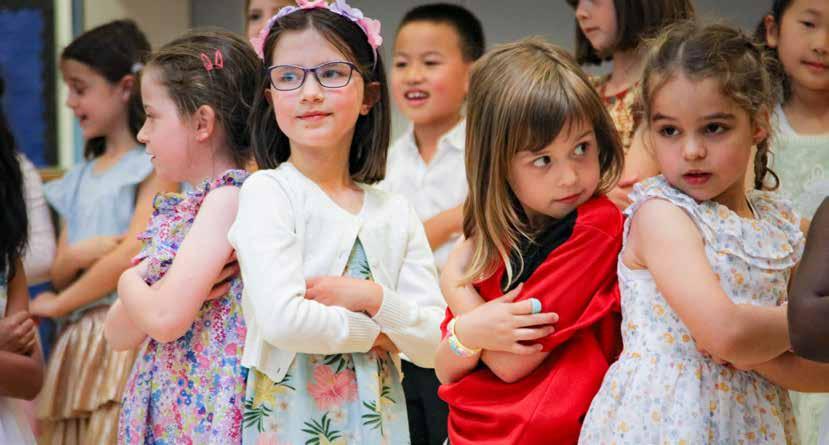
Incredibly, the Music Festival took place against all the odds in March 2021. Over 150 acts performed in the adjudication sessions, which were all live streamed so that parents, families, and friends could watch from home. The festival culminated in a recorded concert, featuring a variety of first-class acts selected by the adjudicator. The performance was then released on eBSB, the school’s online portal, for the whole community to watch. The joy and relief that some performances had finally taken place was palpable, even though they had not been presented to a live audience.
All of this was a massive test in creativity and technical ability for everybody. Staff wanted parents to still have the experience of being an active part of their child’s learning journey – but the big question remained: how could we recreate that during such challenging times?
The necessity of performing online - since parents were not allowed on campus - was an opportunity to rethink performances, and truly allowed staff and students alike to explore the creative possibilities of using technology to share their activities.
The first performance carried out without an audience in Primary was Through the Magic Door, which linked to learning about Minibeasts and Animal Magic. Through the Magic Door allowed the Kindergarten children to develop a distinct set of skills. In addition to expanding their repertoire of songs, they shared ideas about how to respond and move to music for a recorded performance, and it helped develop their confidence to perform in front of a camera.
Away from assemblies, presentations and productions, Primary staff used their expanding knowledge of what was possible and harnessed even more creativity to bring new and exciting experiences to their students and enhance the feeling of togetherness, despite the challenges.
Beyond the performances, staff also sought ways in which they could share pockets of work and activity from a unique perspective. The Early Years online journalling software ‘Tapestry’ was introduced around this time. It was a timely addition that helped staff build a special record of students’ experiences, development and learning journey through their early years and primary education that we could share with parents when they could not be physically present.”
Using photos, videos, and diary entries, Tapestry allowed staff to ‘weave’ the story of the student and how they grew and developed, capturing key learning moments and marking milestones. Parents could
view their child’s progress, the activities provided for them, and how much fun they were having, whilst also uploading their own comments and media. Other activities in Primary included the launch of weekly videos, showing things such as ‘how we learn maths,’ ‘what we discovered in forest school today’… to give a true picture of the students’ day. Staff also introduced weekly storytelling, which was a lovely way to connect, and adapted Enrichment classes so that they could be held online.
Just when it felt that a corner had been turned, once again the plans to stage the postponed 2020 Summer Concert were scrapped. New restrictions made it impossible for the ensembles to rehearse and, with heavy hearts, staff agreed to cancel the concert.
However, the ABRSM examination board made it possible for students to sit their individual online performance exams in summer 2021. Cormac, the school’s new Performing Arts Admin Co-Ordinator, took this on board and organised the entries of over one hundred exams for students in June 2021. This was a record number of exams at any one session, and it took over a week to record them all. This was a positive way to end the school year and gave everyone hope that more could be achieved in the future.
Before the students returned in September 2021, staff across all departments set about adapting plans and teaching methods to address the new regulations.
Because Drama is not taught in Belgian schools, there were no specific guidelines for teaching Drama in the classroom. As a result, Jane Whitehouse had to create a set of guidelines for the school based on theatre guidance from the UK.
When teaching returned to split classes inschool and online, creativity came from the students. Their online peers still featured in performances in class, as they were carried around by a group member, speaking their part out from a screen. With one studio down due to lack of air flow, Campus Ops did their absolute best to find us spaces for lessons and everyone learnt to remedy clash with compromise. But everyone kept going and, as whole classes returned, the students rallied too. GCSE devised examinations were maintained by staff coming in on Saturdays and working as a ‘bubble.’ The lack of audience was made up by the inclusion of a camera and more than a little extra encouragement.
With the new academic year came a real sense of conviction across the whole school. Small positive steps helped to build on that. In the Music department, the instrumental teachers finally returned to school for the annual September meeting. Additionally, the ‘try out’ day returned to its usual format, where the parents and students could meet instrumental teachers in person, with the students getting a chance to try playing the instruments to help decide which they wanted to learn.
As summer turned to autumn, great resilience and determination was shown throughout the school as plans for productions and concerts went ahead under constantly changing regulations and the looming threat of cancellation.
Despite all the challenges everyone faced, the school’s traditional ‘Jazz Night’ in November 2021 managed to go ahead, making it the first live music event for almost two years and one which saw the return of parents and families on campus as audience members. The level of flexibility and ingenuity involved to make such an event happen cannot be understated and it served as a beacon to everyone who was working to get the school back to normality again.










